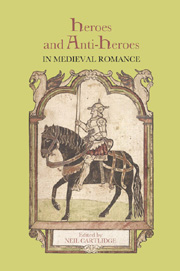13 - Ungallant Knights
from Part II - Character-Types
Published online by Cambridge University Press: 05 February 2013
Summary
Than the Kynge stablysshed all the knyghtes and gaff them rychesse and londys – and charged them […] allwayes to do ladyes, damesels, and jantilwomen and wydowes [socour], strengthe hem in hir ryghtes, and never to enforce them, uppon payne of dethe. (Sir Thomas Malory, Le Morte Darthur)
Brothir, the Kynge oure Sovereyne Lorde woll that […] ye schall sustene wydowes in ther right at every tyme they wol requere yow, and maydenys in ther virginité, and helpe hem and socoure hem with yowre good that for lak of good they be not mysgovernyd. (‘How Knyghtis of the Bath Shulde Be Made’)
Malory's famous Round Table oath, which Arthur and his knights are said to have sworn every Pentecost, gives special emphasis to the appropriate treatment of women. As Neil Cartlidge has recently noted, one might assume that insistence on such behaviour would be self-evident, regardless of one's aristocratic status. But as Cartlidge also notes, it is remarkable just how often romance heroes fail to live up to these basic standards. Eugéne Vinaver calls this passage the ‘most complete and authentic record of Malory's conception of chivalry’, and judging from its correspondences with the oath of the Order of the Bath, recorded in about 1461 by Sir John Astley, Malory's conception of chivalry owes much to contemporary chivalric practices. Undoubtedly, though, in that interchange of chivalric art and chivalric life that typified aristocratic activities in the later Middle Ages, these practices were themselves inspired by romance ideals.
- Type
- Chapter
- Information
- Heroes and Anti-Heroes in Medieval Romance , pp. 201 - 218Publisher: Boydell & BrewerPrint publication year: 2012



